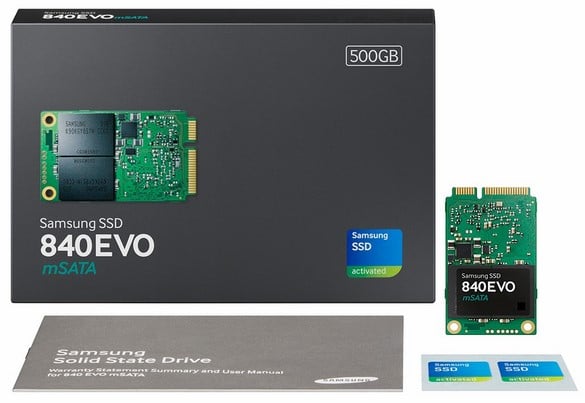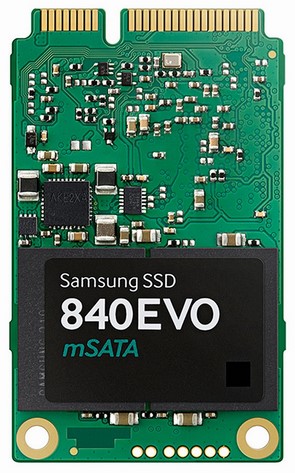Samsung SSD 840 EVO mSATA Review
A few months back, we took a look at Samsung’s SSD 840 EVO series of solid state drives. At the time, we found their performance to be quite good, and the drives were competitively priced too. Shortly after the 2.5” versions of Samsung’s SSD 840 EVO drives hit the scene, the company prepared an array of mSATA drives featuring the same controller and NAND flash. The Samsung SSD 840 EVO mSATA series of drives would be essentially identical to their 2.5” counterparts, save for the mSATA drives’ much smaller form factor.
We’ve got a 500GB Samsung SSD 840 EVO mSATA drive on tap for you here. Since the original release of the Samsung SSD 840 EVO series, the drives have received a couple of firmware updates that seem to have improved performance even further. You’ll see what we mean when you check out the benchmarks on the pages ahead, but before we get to the numbers here are some specifications and pics to get your juices flowing...
|
| Usage Application | Client PCs* |
| Capacity | 120GB, 250GB, 500GB, 750GB and 1TB |
| Dimensions (L* W* H) | 30 x 50.8 x 3.8 (mm) |
| Interface | SATA 6Gb/s (compatible with SATA 3Gb/s and SATA 1.5Gb/s) |
| Form Factor | mSATA |
| Controller | Samsung MEX controller |
| NAND Flash Memory | 1x nm Samsung Toggle DDR 2.0 NAND Flash Memory (400Mbps) |
| DRAM Cache Memory | 256MB (120GB) or 512MB(250GB&500GB) or 1GB (750&1TB) LPDDR2 |
| Performance | Sequential Read: Max. 540 MB/s |
| Sequential Write: Max. 520 MB/s (250GB/500GB/750GB/1TB), 410 MB/s (120GB) | |
| 4KB Random Read (QD1): Max. 10,000 IOPS | |
| 4KB Random Write(QD1): Max. 33,000 IOPS | |
| 4KB Random Read(QD32): Max. 98,000 IOPS (500GB/750GB/1TB), 97,000 IOPS (250GB), 94,000 IOPS (120GB) | |
| 4KB Random Write(QD32): Max. 90,000 IOPS (500GB/750GB/1TB), 66,000 IOPS (250GB), 35,000 IOPS (120GB) | |
| TRIM Support | Yes (Requires OS Support) |
| Garbage Collection | Yes |
| S.M.A.R.T | Yes |
| Encryption | AES 256-bit Full Disk Encryption (FDE) PSID printed in SSD label |
| Weight | Max. 53g (1TB) |
| Reliability | MTBF: 1.5 million hours |
| Power Consumption | Average :100mW*** (Typical) Idle : 45mW (Typical, DIPM ON) |
| Temperature | Operating: 0°C to 70°C Non-Operating: -55°C to 95°C |
| Humidity | 5% to 95%, non-condensing |
| Vibration | Operating: Random: 2.17Grms (7~800Hz) |
| Non-Operating: | Random: 3.08Grms (7~800Hz) |
| Shock | 1500G & 0.5ms (Half sine) |
| Warranty Price: |
3 years limited 120GB at $99.99 and 500GB at $299.99 currently |
Like their 2.5” counterparts, Samsung’s mSATA 840 EVO series of drives feature an updated, triple-core Samsung MEX controller, which operates at 400MHz. The controller is fundamentally similar to the triple-core MDX controller used in the original 840 series, though the MDX controller in those drivers operated at only 300MHz. The 840 EVO’s MEX controller has also been updated to support the SATA 3.1 spec, which incorporates a few new features, like support for queued TRIM commands, for example.
Along with the MEX controller, all of the Samsung 840 EVO mSATA series drives feature some LPDDR2-1066 DRAM cache memory. The 120GB drive sports 256MB of cache, the 250GB and 500GB drive have 512MB of cache, and the 750GB and 1TB drives have 1GB of cache. All of the current-gen Samsung 840 EVO mSATA drives are also outfitted with 19nm TLC NAND flash memory of varying capacities. The 250GB drive features two pieces of NAND (128GB, each), while the 500GB drive you see pictured here has 4 pieces (again, 128GB each). If you do the math, however, you’ll file that the drives leave roughly 9% of the NAND capacity for over-provisioning, which is typical of many current SSDs.
In addition to using a 19nm manufacturing process, Samsung has also dedicated a small portion of the TLC NAND used in these drivers to act like a SLC write buffer—Samsung calls the feature TurboWrite. This allows the TLC NAND to perform more like a MLC drive for writes, as long as the buffer isn’t exhausted. On a 250GB drive, TurboWrite buffer is about 3GB; on the 500GB drive we tested, the buffer is about 6GB.

TurboWrite In Action
TurboWrite should allow the 840 EVO series to perform very well in the vast majority of consumer-class workloads. As you can see in the screen-capture above (taken from HD Tune using a 1TB drive), writes are much faster when the TurboWrite buffer is being utilized, before they taper off.










